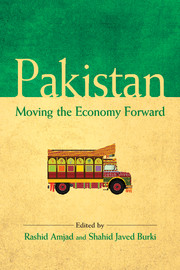Book contents
- Frontmatter
- Contents
- List of figures and tables
- Preface
- 1 Overview
- 2 Failed Economic Promise: Lessons from Pakistan's Development Experience
- 3 Economic Management Under IMF Tutelage: Key Lessons from the Musharraf and PPP Rule 1999–2013
- 4 A Country and an Economy in Transition
- 5 Tackling the Energy Crisis
- 6 Exports: Lessons from the Past and the Way Forward
- 7 The Future Path of Tax Reforms in Pakistan
- 8 Pakistan's Indus Basin Water Strategy: Past, Present and Future
- 9 Economic Governance and Institutional Reforms
- 10 Benefiting from Foreign Direct Investment
- 11 An Analysis of the Remittances Market in Pakistan
- 12 The Prospects for Indo-Pakistan Trade
- 13 Beyond the Poverty Line: A Multidimensional Analysis of Poverty in Pakistan
- 14 Can the New Intergovernmental Structure Work in Pakistan? Learning from China
- Contributors
- Index
14 - Can the New Intergovernmental Structure Work in Pakistan? Learning from China
Published online by Cambridge University Press: 05 May 2015
- Frontmatter
- Contents
- List of figures and tables
- Preface
- 1 Overview
- 2 Failed Economic Promise: Lessons from Pakistan's Development Experience
- 3 Economic Management Under IMF Tutelage: Key Lessons from the Musharraf and PPP Rule 1999–2013
- 4 A Country and an Economy in Transition
- 5 Tackling the Energy Crisis
- 6 Exports: Lessons from the Past and the Way Forward
- 7 The Future Path of Tax Reforms in Pakistan
- 8 Pakistan's Indus Basin Water Strategy: Past, Present and Future
- 9 Economic Governance and Institutional Reforms
- 10 Benefiting from Foreign Direct Investment
- 11 An Analysis of the Remittances Market in Pakistan
- 12 The Prospects for Indo-Pakistan Trade
- 13 Beyond the Poverty Line: A Multidimensional Analysis of Poverty in Pakistan
- 14 Can the New Intergovernmental Structure Work in Pakistan? Learning from China
- Contributors
- Index
Summary
Introduction
The 18th Amendment to the 1973 Constitution of Pakistan disentangles overlapping spending responsibilities between the federation and provinces in a wide range of functions, devolving them to the latter. The legislation was also a reaction to relatively poor service delivery and living standards that had fallen continuously behind those in other countries in South Asia, and, indeed, are now lower than sub-Saharan Africa in most respects.
The Musharraf government had used this argument for its own decentralization effort—delegating power to the districts and bypassing the political centers of power in the provinces. The 18th Amendment reasserts the provinces' power and the associated political centers of power. It is designed to weaken the center, and correspondingly make it less attractive for the military to assume power by moving against an elected Prime Minister, as it has done periodically in Pakistan's history.
But will this major reform work effectively and ensure higher living standards for all people in all the provinces? To what extent is the need for a national identity important in ensuring that the decentralization does not cause the federation to unravel or the overall delivery of public services to deteriorate and lead to greater exclusion of the poor? These are important issues and could well determine the fate of the 18th Amendment as well as social stability in Pakistan.
Section 2 outlines developments in theory linking governance and the decentralization process. The links between the two are critical. The main question is whether decentralized service provision can better provide for the poorer sections of society by utilizing information that may be available at the local level in tailoring services to local preferences and making access easier. How are these responsibilities financed? Does the process impede closer economic integration between the federating provinces? This chapter argues that positive approaches to intergovernmental reforms, as exemplified by the People's Republic of China, are perhaps more important for countries such as Pakistan that face significant structural challenges.
- Type
- Chapter
- Information
- PakistanMoving the Economy Forward, pp. 358 - 392Publisher: Cambridge University PressPrint publication year: 2015

